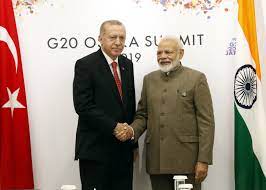
India-Türkiye relations are never at dagger’s drawn but need a semantic shape

India-Turkiye relationship
India-Turkiye relations need a semantic shape. The relationship between India and Turkey is never tense, but it needs a semantic shape i.e conceptual framework. With the earthquake disaster striking the Anatolian plateau, the people of the two countries Turkiye and Syria are facing the most challenging times. Helps from around the corner of the world are started pouring in for Turkiye and Syria with India being upfront in sending all possible help to Turkiye where the catastrophe is immense and wherever possible.
This eventually resulted in the Turkish ambassador to India tweeting a thanks message to the Government of India mentioning the common usage of the word ‘Dost’ both in Turkish as well as in Hindi/Urdu in India which means ‘Friendship’. In all media, there is large coverage of India’s ‘Operation Dost’ which is directed at meeting Turkiye’s emergency circumstances. In the midst of these tragic circumstances, the people of Turkiye are also welcoming the humble gesture of Indians towards them. India-Turkiye’s bilateral relations are more in light in the last few years due to the ever-growing camaraderie between Pakistan and Turkiye and India’s support to Armenia in the Armenia-Azerbaijan conflict.
There has been some dissension seen between the two parties however it doesn’t mean at any time that India-Turkiye’s relations(their semantic shape) are at dagger’s drawn but the need of the hour is that New Delhi and Ankara should define their bilateral ties in order to solidify their long term future partnership. If there are points of contention then there are points of convergence too where both states can work like:
1. Independent Foreign Policy: India-Turkiye are among the few countries that have dealt with both the west and Russia during the last nearly a year of the war between Ukraine and Russia where the western powers under the banner of NATO are supporting Ukraine. Turkiye though is a part of NATO convinced Russian President Vladimir Putin on the issue of the grain deal, on the other side India though has nothing to do with NATO maintained economical ties with Russia despite the fear of enormous sanctions from the western counterparts.
The interest of India and Turkiye is not on the same page but they have maintained their independent policy. India and Turkiye should focus on broader and long-term geopolitical goals and try to bring balance in the current scenario to bring down tensions arising due to conflicts in the world. New Delhi won’t interfere and won’t have any issues regarding Ankara’s affable partnership with Islamabad but India should discuss with Turkiye and clearly stand that ‘Kashmir is an internal matter of India.

2. Culture and Trade- It is more than just the word ‘Dost’ that both countries have things similar which can bridge the people of Turkiye and India. Whether it is the philosophy of Mustafa Kemel Ataturk or Mohandas Karamchand Gandhi both valued secularism and democratic ideals therefore both governments can promote their citizens to learn the philosophies of two great personalities.
When it comes to trade both India and Turkiye(semantic shape) abide by the bilateral trade agreements of 1983, however, there is a noticeable decline in trade between both parties in recent years. The existing trade is in favour of India with more exports going to Turkiye than imports from it. India and Turkiye can discuss issues like attaining trade balance and increasing the volume of trade.
Turkiye can attract Indian tourist to boost their tourism industry which is the largest in the world that can not only boot their economy but also enhance relations between the two nations. Thus both dost have the opportunity to build a solid partnership in the times to come.








